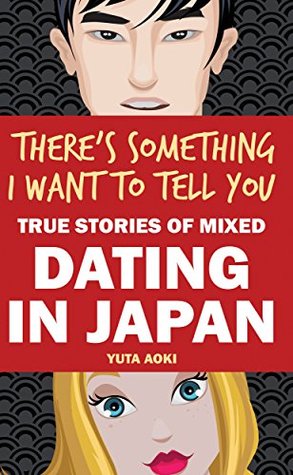Exploring cultural differences in my intercultural and international marriage has long been at the heart of my blog. Which is why, when Yuta Aoki contacted me about his new book exploring cultural differences for mixed couples dating in Japan, I jumped at the chance to do an interview.
There’s Something I Want to Tell You: True Stories of Mixed Dating in Japan profiles 15 different people (spanning eight nationalities, both straight and LGBT) dating across racial and cultural borders in the country. Yuta’s deeply personal interviews touch some of the most private and intimate details of their love lives. He follows up each of the stories with a discussion of the cultural dynamics going on between the couples, which makes the book even more valuable. Whether you’re curious about intercultural dating in Japan or already in an intercultural relationship, you’ll find this a fascinating addition to your library.
I’m excited to introduce you to Yuta Aoki and There’s Something I Want to Tell You: True Stories of Mixed Dating in Japan through this interview.
Here’s Yuta’s bio from Amazon.com:
Yuta Aoki is a Japanese author, blogger, and YouTuber. He writes about Japanese culture, multi-cultural communication, and dating.
He is a chronic traveler. He has been to more than thirty countries, from Eastern Europe all the way across to Southeast Asia. He enjoys talking to local people and listening to their stories. His desire to share the best of these stories inspired him to write There’s Something I Want to Tell You – True Stories of Mixed Dating in Japan.
He dates internationally, although he’s slightly worried that he might end up spending more time writing about dating than actually doing it.
He was born and raised in Japan.
You can learn more about Yuta at his blog at YutaAoki.com.
I asked Yuta about everything from how he was able to get people to speak so candidly about their love lives, to his response to people who think culture doesn’t matter in intercultural dating:
—–
Tell us about the inspiration for writing this book.
One huge inspiration was my friend’s story about how she met her husband. She is African-American and her husband is Japanese.
One day, she was walking down the street of Gunma, a Japanese prefecture where she liked at that time. A car approached behind her and pulled up.
‘What’s up?’ the man inside shouted in English. He was Japanese.
‘Uh… good evening,’ she replied in Japanese, hesitantly.
He smiled, wanting to continue the conversation.
But she wasn’t up for a random chat. It was already getting dark. The sun was going down. She walked away.
She would have forgotten him, had it not been for the birthday party she was going to the same night. The party took place on the 2nd floor of a building where there were several bars.
During the party, her phone rang. It was her friend.
‘Hey, can you come downstairs? There’s someone I want to introduce you to,’ her friend said.
When she came downstairs, she noticed a familiar-looking man.
‘Hey, you are the guy from the car!’ she exclaimed.
That was how she met her husband.
This story made me realize that people had unusual dating stories. I also remembered a friend who had made countless crazy boyfriend, one of which had run 40 kilometers (25 miles) just to see her. I wanted to know more.
You share a variety of stories about dating in Japan from people of different nationalities, racial backgrounds and sexual orientations — many of them diving into very intimate and personal details about the relationships. How did you find the people to interview for this book? And how were you able to get them to speak so candidly on the record?
Finding people to interview was quite easy as I already knew very diverse people who lived in Japan. All I had to do was ask around. Then some of them introduced me to other people.
I think the reason why those people opened up was that most people actually want to talk about their relationships. Often, we are afraid of being judged. But once someone stars actively listening to you, you can’t stop.
I think being interviewed is a very interesting experience. I encourage you to try it if there’s an opportunity. If you have an interesting dating story, contact me!
What’s your favorite story from this book and why?
Every time people ask that question, I come up with a different answer because there are so many interesting stories.
There’s an American girl called Lily, and I loved her quasi-relationship with a dorky, smart, obsessive Japanese guy called Aiba-kun. Lily wants to be his friends because he’s a smart guy and likes Japanese literature which she likes a lot. He’s also one of few friends Lily made back in university in Nagoya. But Aiba-kun doesn’t seem to be able to shake off his romantic obsession. There have been countless misunderstandings—both personal and cultural—between them.
Once, Lily decided to go on a “date” with him. She knew he hadn’t dated any girl before, so she wanted him to experience what it was like to go out with a girl. She was always clear that she wasn’t interested in him, but it was difficult for him to hold back his feelings.
Lily had to go back to the States, but they continued exchange emails even though she found it difficult to write long messages in Japanese.
Eventually, she came back to Japan and started living in Tokyo, quite far from Nagoya. One day, Aiba-kun showed up in her house unnoticed. It was an awkward meeting. Lily had to take him to a nearby café and convince him to leave because he kept insisting on dating her.
But their (sort of) friendship still continues. Lily thinks that once he gets over his infatuation, they can be really good friends.
I like this story because it has several layers of misunderstanding. On one hand, there is American dating culture that tends to be more casual and relaxed. On the other hand, there is an awkward boy who is not experienced with women. I find their friendship kind of cute.
Was there anything you learned about dating in Japan in the process of writing this book that surprised or shocked you?
It’s not so much surprising as curious, but so many Japanese people in those stories are, well, Japanese, in their way of thinking.
Western women who date Japanese men often find it confusing that Japanese men don’t always express their emotions and thoughts verbally.
Michelle, a Finnish girl, says her Japanese ex-boyfriend didn’t want to talk about bad things because he didn’t like confrontations. He wasn’t a talkative guy, and when they went on a date, he didn’t have much to say. She wanted him to talk more.
Kala, another African-American woman, talks about the ‘automatic translator’ that she invented to decode her Japanese husband’s non-verbal messages. When her husband is hungry, he comes around the kitchen, where she is cooking, and asks, ‘Do you need any help?’ But Kala knows he is not really offering help. It’s his indirect way of saying, ‘I’m hungry.’
Lack of verbal, direct communication is just one thing. There are a lot of recurring themes about dating in Japan: mind-reading, passiveness in bed, accommodating personalities, private nature of dating, etc. It was interesting to re-discovering my own culture.
What would you say to people who claim that culture doesn’t matter in intercultural dating?
I think what they really mean is that cultural differences can be overcome, which isn’t false.
But some people overlook or simply don’t notice cultural differences and that can be a problem. I remember Andre, a Jamaican man, who dated a Japanese girl who had a completely different communication style.
When she wanted to stop seeing him, she simply stopped answering his text, which confused Andre a great deal because he needed a verbal, explicit explanation. The more he pushed, the more irritated she was. It wasn’t necessarily his fault because from her part, she was unable to communicate with him effectively. Instead, she just became angry and passive-aggressive, which confused him even more.
It turned out their relationship had been fraught with misunderstandings, which neither of them fully understood. I think a little understanding of cultural and personal differences would have made their relationship much more pleasant.
What do you hope people come away with after reading your book?
I hope that people come away with a good understanding of what to expect in dating in Japan. At the same time, I hope people notice that there are many Japanese people who don’t fit the Japanese stereotypes. I included very diverse people in my book, so I you can understand dating in Japan from different angles.
—-
Thanks so much to Yuta Aoki for this interview! Learn more about Yuta at his blog at YutaAoki.com. You can find There’s Something I Want to Tell You: True Stories of Mixed Dating on Amazon.com, where your purchase helps support this blog.



Solute for 17 Brave Chinese Fire Fighters who sacrificed their lives in Massive Blast in Tianjin, China. Your souls will be saved in Heaven
A Men
Sounds pretty interesting. It is amazing how some people meet, especially when they are from different countries. I like exploring the cross-cultural aspect of dating. I wish there was also a book like this about mixed couples in China.
It sounds like a really interesting book! I think cross-cultural couples should be aware of the degree of misunderstanding that they are likely to have down the line. It is one the biggest challenges of cross-cultural dating, but it can be overcome with some dedication and willingness from both parties.
I’m going to have to put this on my reading list. 🙂
“It was interesting to re-discovering my own culture.” This is so true. Until I saw my white family’s holiday meals through my husband’s Asian eyes, I didn’t realize how strange it might seem to have a meal secondary to the mealtime conversation.
According to Andy: “I think I know now why you all have such small mouths. It’s great for talking really fast. It’s not so good for actually consuming food.”